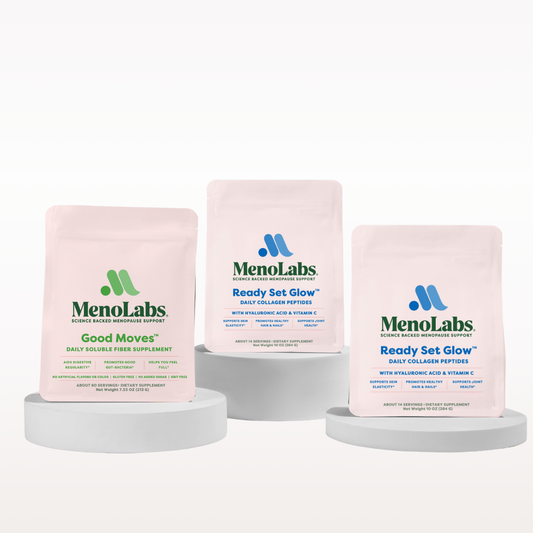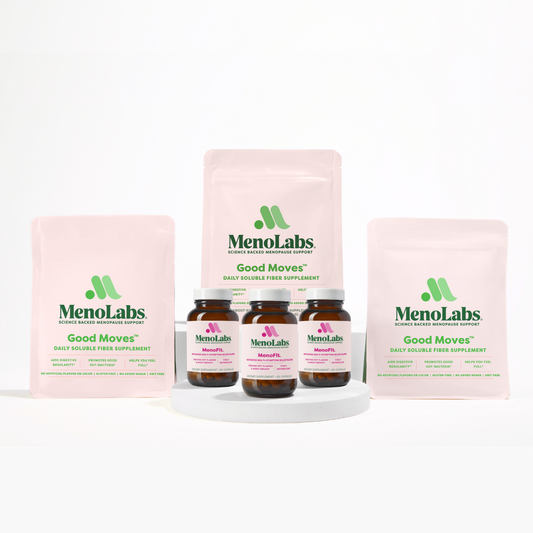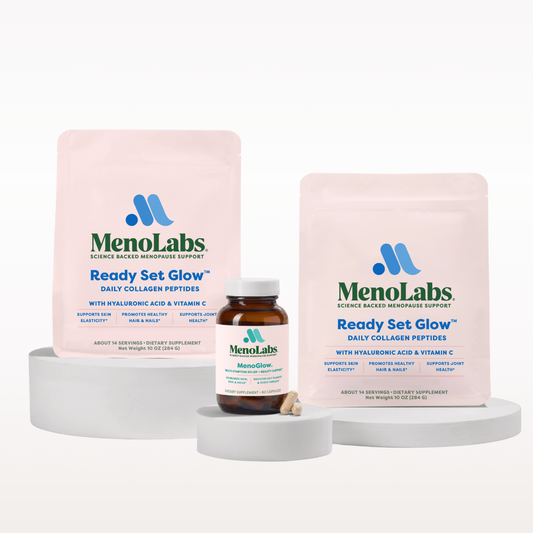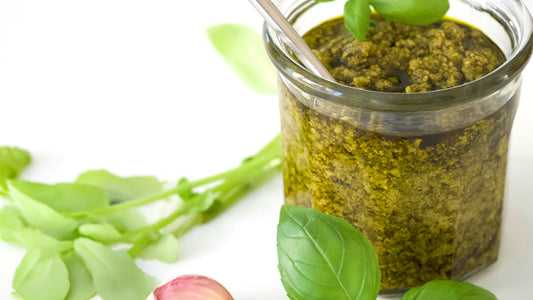
- Healthy Eating
- Nutrition
- The Science
Fall Fruits and Veggies for Women to Eat During Perimenopause
A lot of us think of summer as the season of fresh produce — but the fall boasts plenty of its own vitamin-packed fruit and veg.
1 min read
A lot of us think of summer as the season of fresh produce — but the fall harvest season boasts plenty of its own vitamin-packed fruit and veg. While the warmer months are known more for their light and water-rich goods like berries, melons, and greens, autumn crops are often heartier, like potatoes and squash (though the fall months also have their share of fresh greens and juicy fruits). And since the North American Menopause Society recommends a diet rich in fruits and vegetables to help alleviate symptoms, it’s important to know what’s out there and how they can benefit you through perimenopause and beyond. Eating in season not only ensures that we get the best-tasting veggies on our plates; foods in season contain higher levels of nutrients that may help reduce menopause symptoms.
Check out some of our favorite produce choices of the season — as well as the perimenopause benefits they offer when consumed as part of a balanced diet.
Broccoli
Broccoli season begins in October as the weather cools down; the veggie stays in season through the winter due to its frost tolerance. This hearty cruciferous vegetable is a nutritional powerhouse, though one that has traditionally been the poster child for “gross but good-for-you vegetables.” Of course, broccoli isn’t gross at all. In fact, it’s one of the most popular vegetables in the United States and can be prepared in countless ways, to match almost any taste.
Broccoli is good for women in perimenopause for multiple reasons. Its phytochemicals content includes glucosinolates, indole-3-carbinol, and isothiocyanates which have specific roles in detoxification and liver support. Liver support is crucial throughout the menopause transition as drops in estrogen can hinder its regenerative abilities and contribute to liver disease. And in one 2021 study, researchers found that intake of polyphenols like the ones found in broccoli correlated with significant improvements in mood, hot flashes, and stiffness in menopausal women.
Grapes
Generally, the peak of grapes season in the United States runs from August through October. However, 98 percent of table grapes in the U.S. are grown in California, where the grape season lasts through December. So, you’ll find some of the ripest and most flavorful options on supermarket shelves throughout autumn.
Grapes are rich in the mineral boron which affects the levels of calcium, vitamin D, and estrogen in the body. While the decrease in estrogen production alongside a lack of calcium and vitamin can contribute to bone loss in menopause, eating fruits rich in boron may help combat that. In one randomized control trial, grape seed extract was associated with a decrease in hot flashes, sleep issues, feelings of anxiety, and depression. with improved muscle mass and reduced blood pressure in women experiencing menopause symptoms. And grapes are rich in resveratrol, an antioxidant associated with disease prevention and menopausal symptom treatment.
Soybeans
Since a lot of us eat the majority of soy in our diets in the form of processed animal product alternatives like tofu and soymilk, you may not initially think of it as a vegetable. But soybeans are, in fact, a member of the protein-rich legume family of vegetables. And generally, in the U.S., soybeans are planted in late spring/early summer, begin to mature in September, and are harvested in October and November, making them an autumn crop.
Soybeans are so nutrient-dense, the 2020-2025 Dietary Guidelines for Americans mention them as a healthy choice under the categories of vegetables, dairy (as a fortified alternative), protein, and healthy fats. Soy is also rich in isoflavones, phytoestrogens that may have estrogen-like effects on the body. Since menopause symptoms are associated with drops in estrogen production, a lot of modern research has gone into the relationship between soy and symptom relief. One study by the North American Menopause Society found a plant-based diet rich in soy reduces moderate-to-severe hot flashes by 84 percent. Another study found that soy foods may play a role in preventing osteosarcopenia and obesity that may occur after menopause. To get the nutritional benefits and menopause relief that soy may provide this season, try buying fresh edamame and seasoning it at home for a healthy snack that’s a great alternative to chips or crackers.
Squash
Whether you want to classify it as a fruit or as a vegetable (it’s kind of both), no produce item says “autumn” quite like the humble squash. But considering the variety and seemingly endless ways of preparing them, cooking squash can be intimidating for a lot of us. But we promise, it’s worth having two or three favorite recipes in your back pocket.
Squash is fiber-rich food with some variations like butternut having both the soluble and insoluble type of fiber present. Fiber feeds the microbiome for a healthier and more diverse population of good gut bacteria. As the decrease in estrogen levels occurs, it’s important for perimenopausal women to incorporate plenty of fiber into their diet, in order to promote the growth of good bacteria and support overall microbiome health. And a healthy microbiome supports almost all other bodily systems, including mental health. This may help explain the results of research that found fiber intake linked with a modest positive effect of depression in perimenopausal women.
Apples
A fall fruits and veggies list wouldn’t be complete without apples. After all, apple picking is a quintessential autumn outing, and its product is the cornerstone of so many of our favorite fall dishes. But as delicious as apples are, they’re also incredibly good for you. The old adage “an apple a day keeps the doctor away” doesn’t exist without reason!
Women in menopause have even more reason to grab an apple as a snack. Apples are rich in phytoestrogens that may help combat hot flashes. And one study of overweight women ages 30 to 50 found a statistically significant difference in weight loss between the group supplementing with apples versus the control group. Furthermore, apples are also a great source of boron so, like grapes, they may help prevent bone loss associated with drops in estrogen in menopause. Finally, multiple studies have found that apple consumption is inversely associated with coronary heart disease mortality in postmenopausal women, suggesting that eating plenty of apples is good for long-term heart health.
***
The changes our bodies go through in perimenopause make it more important to pay attention and regulate the foods we eat. Research is continuing to find more about the impact of diet in menopause and its potential in reducing symptoms. A plant-based, low-calorie diet is largely thought of to be the most beneficial, meaning we should build our meals around fruits and vegetables.
Related Products
Blend Besties Bundle
Fresh Start Bundle
4.7 / 5.0
(553) 553 total reviews











